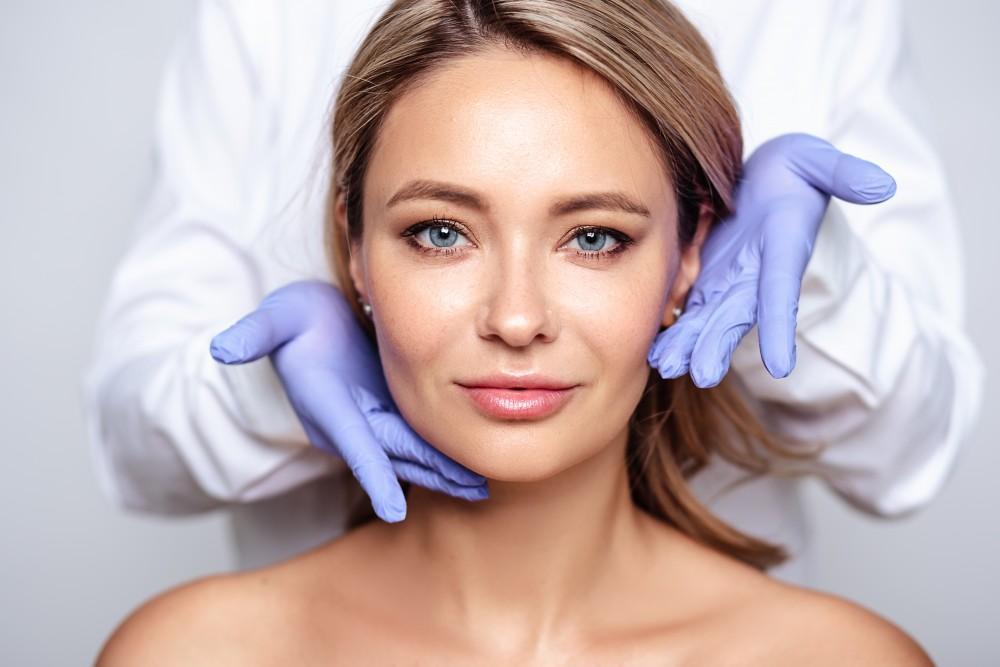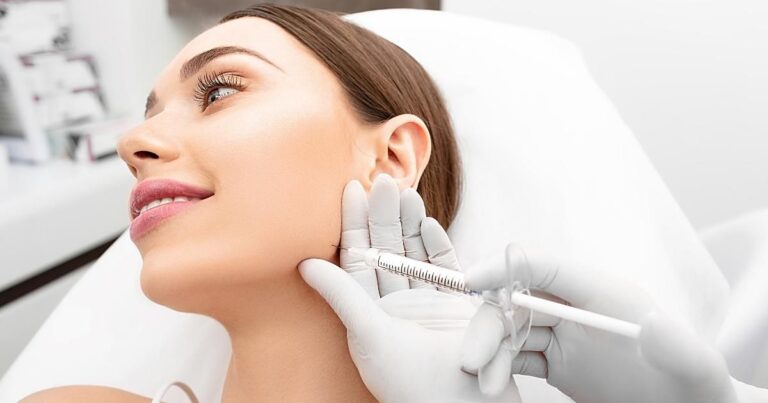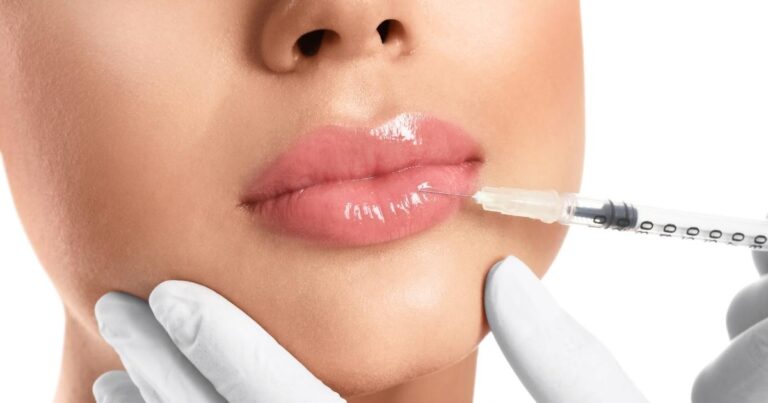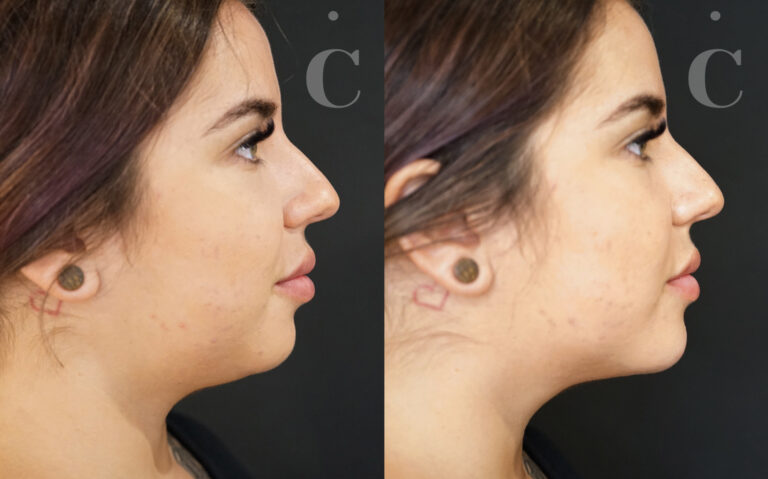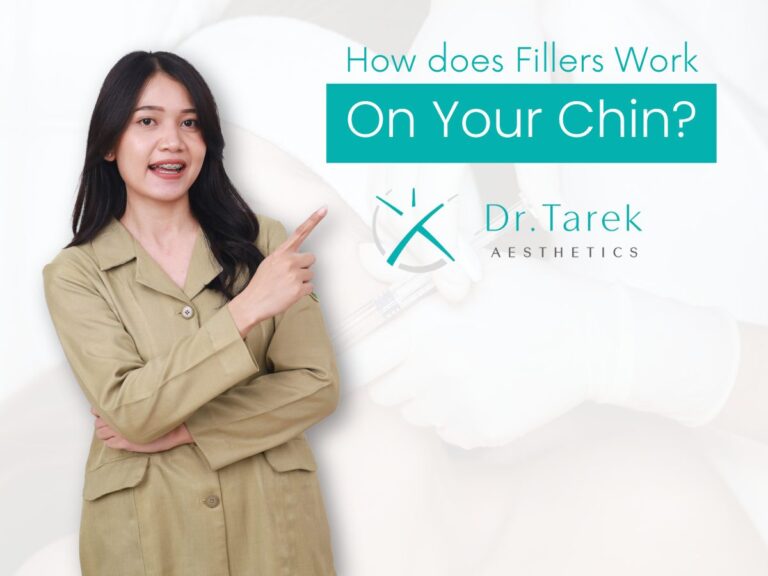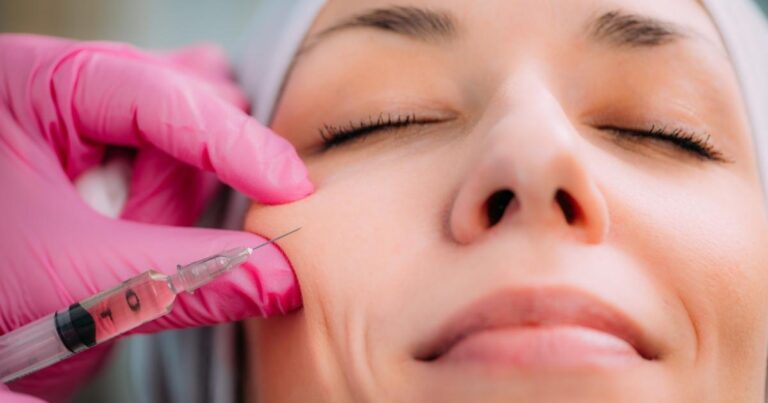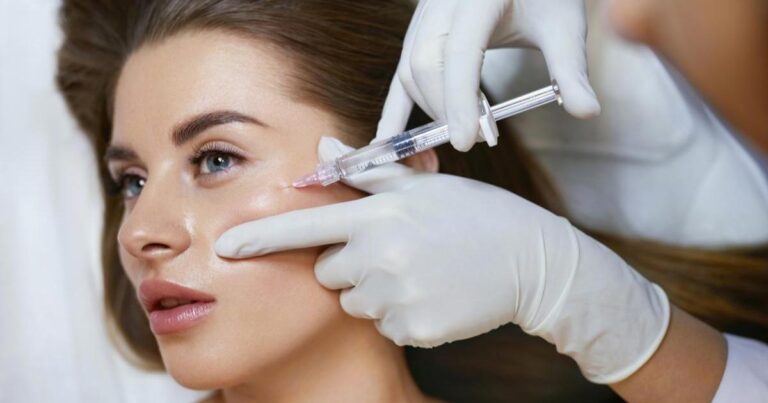Dermal fillers, a prevalent choice for diminishing signs of ageing and enhancing volume in areas such as the lips, raise questions about safety like any cosmetic procedure. In this in-depth exploration, we delve into the safety of dermal fillers, grounding our discussion in scientific evidence. Addressing the core query, Are dermal fillers safe? We aim to provide a comprehensive understanding based on factual research and expert insights.
What Are Dermal Fillers?
Dermal fillers are gel-like substances injected under the skin to restore lost volume. The most common dermal fillers are made from:
- Hyaluronic acid – is a naturally occurring substance that helps the skin retain moisture and add fullness. Brand names include Juvederm, Restylane, and Hylan B.
- Calcium hydroxylapatite is a mineral found in bones and teeth. Common brands are Radiesse and Radiance.
- Poly-L-lactic acid (Sculptra) – a biocompatible synthetic material that stimulates collagen growth.
Benefits of Dermal Fillers
When skillfully injected by an experienced provider, dermal fillers offer impressive cosmetic benefits:
- Plump thin lips
- Soften facial creases and wrinkles
- Add fullness to hollow cheeks or temples
- Contour facial features
- Rejuvenate hands by reducing the appearance of veins and tendons.
The results from dermal fillers are instant and long-lasting but not permanent. Eventually, the body metabolises the filler, so touch-up injections are needed to maintain results.
Book A Consultation With Dr Tarek Bayazid
Top-rated Plastic Surgeon For Fillers in Dubai
Installment Plan Available
Are Dermal Fillers Safe?
The safety profile of leading dermal fillers is exceptional. Data show that when performed correctly by board-certified providers, these cosmetic injections have low risks of complications and high patient satisfaction.
For example, in clinical studies of popular hyaluronic acid fillers like Juvederm:
- Over 90% of subjects rated their treatment as worthwhile
- Over 80% were satisfied with their treatment results at the 6-month follow-up*
*Source: Juvederm Post-Approval Studies
However, as with any cosmetic intervention, dermal fillers do pose some risks. It’s important to educate yourself on potential side effects, understand what to expect during treatment, and choose an experienced, reputable injector to minimise risks.
Potential Side Effects
The most common side effects are generally mild in severity and last seven days or less, including:
- Temporary injection-site redness, swelling, pain, tenderness
- Bruising
- Headache
Uncommon, temporary side effects lasting 7-14 days may potentially include:
- Asymmetry, unevenness, irregularity
- Lumps/bumps under the skin
- Rash
With proper injection methods by an expert provider, these side effects usually resolve on their own. But if you do have any moderate or severe reactions, contact your doctor right away.
More serious complications like infection or skin damage are very rare, especially when getting dermal fillers from a board-certified plastic surgeon or dermatologist.
Key Factors That Impact Safety
Multiple factors affect the safety profile and risk of side effects from dermal fillers:
Filler Ingredient
- Hyaluronic acid fillers tend to have the lowest risk profile. The hyaluronidase enzyme can be injected with HA fillers to reverse the filler quickly if needed.
- Calcium hydroxylapatite (CaHA) fillers like Radiesse may stimulate more swelling. They also cannot be dissolved with hyaluronidase if there are complications.
- Sculptra requires special injection techniques as unevenness and nodules may show up weeks later. An experienced provider is crucial.
Provider Skill and Training
The doctor administering your filler treatment should have in-depth expertise, including:
- Advanced training in cosmetic filler injections and facial anatomy
- Artistic eye for precision injections and a balanced, natural look
- Use of proper injection techniques to minimise risks
- Ability to properly dissolve filler with hyaluronidase if needed
Doctors with surgical backgrounds, like plastic surgeons and oculofacial doctors, tend to have exceptional injection skills. Always review your doctor’s before and after photos and qualifications.
Adherence to Safety Standards
Reputable clinics adhere to strict safety protocols like:
- Using sterile needles for each injection
- Disinfecting the skin prior to injections
- Avoiding injections directly into blood vessels (intravascular injection)
- Carefully reviewing medical history for bleeding risks or allergies
Open Communication
Before your appointment, your doctor should explain:
- What filler do they recommend, and why
- Expected number of syringes needed for your desired outcome
- Costs and payment plans, if applicable
- Potential side effects and what to do if they occur
Open communication allows you to understand risks and make an informed decision.
How to Minimize Risks with Dermal Fillers
Follow these tips to reduce risks with filler injections:
Choose an Experienced, Reputable Doctor
- A board-certified plastic surgeon or dermatologist
- Expertise in cosmetic filler injections
- Uses advanced injection techniques
- Has professional accreditation
- Positive reviews and patient results
Follow Aftercare Instructions
Properly caring for your skin after the injections is vital to minimise risks like swelling, bruising, bumps, or unevenness. Follow your doctor’s specific aftercare advice, which may include:
- Applying ice packs to reduce swelling
- Avoiding alcohol or blood thinners several days before/after injections
- Sleeping face-up and slightly elevated if significant swelling occurs
- Massaging any uneven areas as directed
Proper aftercare enhances results and reduces risks of side effects. Notify your doctor about any unusual reactions immediately.
Are Certain Patient Groups More At-Risk?
Some patients have higher risks of complications with dermal fillers or should not receive them at all, including:
Contraindications Where Fillers Should Be Avoided:
- Autoimmune disorders like lupus or rheumatoid arthritis
- History of severe allergies or anaphylaxis
- Bleeding disorders like hemophilia
- Active skin issues like rashes, infections, cysts
Higher Risk Patient Populations
- Patients on blood thinners due to higher bleeding/bruising risks
- Patients with very thin skin or little underlying facial fat due to the visibility of bumps
- Ethnic minorities with higher risks of post-inflammatory pigmentation changes
Always disclose your full health history so your provider can determine if dermal fillers are appropriate for you or if extra precautions are warranted.
Ask Your Doctor These Key Questions
Don’t hesitate to ask questions before your filler consultation. Essential questions include:
- Are the side effects reversible, and what options exist if I am unsatisfied?
- How can side effects be treated or minimised?
- Do you adhere to all standard safety protocols during filler injections?
- How can I best care for my skin after fillers to reduce risks?
- How soon after injections is it safe to resume my normal activities?
- How long should the treatment results realistically last?
Reputable doctors welcome questions and want you to feel fully educated, comfortable, and confident about dermal fillers. Jaw filler’s impact on double chin is that it can make the chin look smaller and more defined. It’s like giving your chin a little makeover!
Key Takeaways on Dermal Filler Safety
In summary, while no cosmetic treatment is risk-free, dermal fillers have an impressive safety profile:
- Made of well-tested, biocompatible ingredients
- Produce beautiful, long-lasting enhancements
- Have a strong record of safety with minimal side effects
- Risks can be reduced by an expert provider using proper techniques
To ensure successful, safe outcomes with dermal fillers:
- Do Your Research: Understand the benefits, risks, and alternatives before deciding if dermal fillers are right for you.
- Choose Your Doctor Carefully: Select an experienced, board-certified plastic surgeon or dermatologist to perform your injections.
- Follow Recommended Aftercare: Adhere to all your doctor’s self-care instructions to allow safe healing and optimal results.
If you’re excited about enhancing your beauty with dermal fillers, take the next step by booking a consultation with Dr Tarek Bayazid – The best Plastic Surgeon in Dubai.
Book a consultation with Dr. Tarek will:
- Listen to your cosmetic goals and concerns
- Assess your unique facial anatomy
- Recommend an optimal, personalised filler treatment plan
- Answer all your questions so you feel fully confident moving forward!
FAQs
Can Anyone Get Dermal Fillers?
Most people in overall good health make great candidates for HA fillers and many other leading options. However, some medical conditions mean fillers may be too risky or simply will not work well. Be sure to discuss your medical history in-depth prior to treatment.
What’s Better: Dermal Fillers or Botox?
Botox and dermal fillers complement each other beautifully! Botox relaxes wrinkle-causing muscle activity, while fillers restore lost facial volume. Many patients choose Botox + fillers for a complete facial rejuvenation combo. Your doctor can advise you on the ideal anti-ageing plan tailored to your individual needs.
Will My Face Look “Overdone” with Fillers?
In the hands of a board-certified plastic surgeon with an artistic eye, you should never look “overfilled”! However, even natural-looking results do have an adjustment period of 1-2 weeks as swelling resolves. Be sure to communicate your aesthetic goals so your doctor can advise you on a youthful, balanced outcome.
Subtle touch-ups over time always look more natural versus aggressive filling all at once.
Can Fillers Correct Aging Changes Besides Wrinkles?
Absolutely! While smoothing fine lines is an obvious benefit, fillers beautifully:
- Restore age-related facial fat loss
- Lift sagging cheeks
- Enhance hollow under eyes
- Reshape and balance facial features
- Plump thinning lips
- Soften hands/chest
Talk to your doctor about your unique rejuvenation goals. You may be amazed that targeted filler injections can help concerns beyond just wrinkles!
Is There a Non-Invasive Alternative to Dermal Fillers?
Options like skin-tightening Ultherapy or radiofrequency microneedling can mildly improve some signs of facial ageing non-invasively. But for significant, longer-lasting improvements in volume loss and wrinkles, injectable fillers remain the gold standard.
